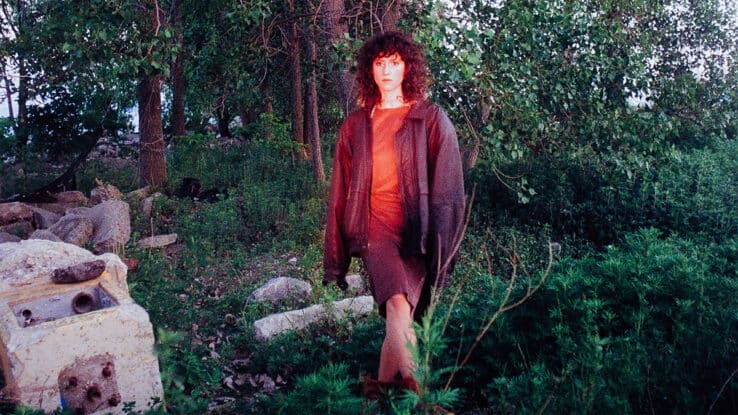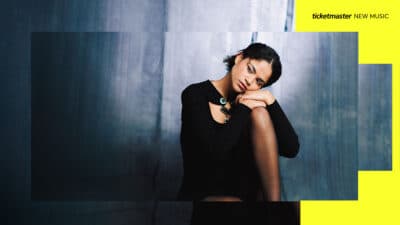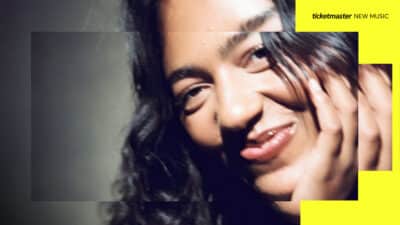Interview

Interview
Squirrel Flower: “It didn’t feel right to leave anything up to interpretation”
The Chicago-based indie-rocker talks changing up her sound and pursuing her passion
Squirrel Flower began when Ella Williams arrived in Iowa for college, and took a class in sound art. She had been writing songs for a while, but for the first time, she learned that there could be more ways to tell a story with music than she had thought. “My world was blown open by all of the things that music could be,” she tells us. Borrowing the name Squirrel Flower from a character she had invented in childhood, she set about exploring this newfound inspiration; discovering a voice on the electric guitar – alongside her literal, often stunning voice – that created rich, gorgeous, melancholic new worlds.
She released her debut full-length, I Was Born Swimming, in 2020, before putting out its darker follow-up, Planet (i), in 2021. Her latest, Tomorrow’s Fire, is the first she has self-produced (along with co-producer Alex Farrar), and it’s more rock-oriented than any of her previous work. ‘Full Time Job’, for example, has a pounding intensity as it crashes in after a slow-burn intro, while ‘Intheskatepark’ has a fuzzy slacker drive.
The album was named after a novel written by Williams’ great-grandfather, Jay Williams, which in turn was taken from a line by the French medieval poet Rutebeuf – “Tomorrow’s fire must warm tonight”. It’s about believing that passion will prevail even when things look dark. Given the current circumstances for independent artists, the idea spoke to Williams; a lot of the lyrics on the album, such as ‘Full Time Job’ and ‘When A Plant Is Dying’, see her grappling with the desire to live a fulfilled life in a society where rising costs and the threat of climate disaster tend to crush that kind of hope.
Squirrel Flower starts her UK headline tour in November, and it will be the first time she’s bringing a full band with her. Ahead of the shows, we spoke to Williams about her writing and production process, her drive to keep chasing her passion, and more.
What made you go for a heavier sound for this album?
I’ve always had moments of my records that get really loud, and have that distorted guitar feel. But this record just pushes it over the top a little bit. A lot of the songs, as I wrote them, I could only imagine them being really heavy and really intense and not restrained at all. I think it’s just about the types of songs I was writing, and the subject matter. It felt like a lot of the content needed to be sort of like, screamed into the world. I think they’re less introspective, they’re more immediate. They’re coming from a place of desperation, and a place of frustration. And a lot of them are coming from a place of very vibrant hope. And it didn’t feel right to leave anything up to interpretation, almost. I wanted it to be as immediate as possible.
This is the first album you self-produced. What kind of choices did you make in production?
I think with this record I paid a lot more attention and put a lot more intention into the sound, and into kind of finding the perfect place for each song to exist. With ‘Canyon’, for example, I wanted that song to literally sound like rocks echoing, breaking off of a cliff and falling into the canyon. So I wasn’t thinking, ‘how can I make this sound good?’ I was thinking, ‘okay, how can I make this sound like the scene I’m imagining?’ Sort of like making a sculpture or creating an environment with the sound of the instruments.
A lot of this album is about the frustration of being a young person and an artist right now. Were there specific experiences or circumstances that made you think about that while writing this album?
During the time where I was writing the record, a lot of the people around me and people close to me were unemployed, and we didn’t have a lot of prospects. There was this period where it just felt like me and everyone around me was in this strange zone of wanting something more from life. Just like struggling financially and not wanting to just get a normal job and fall into that. And trying to navigate like, how to do that? Can we live alternatively, is it possible?
What kind of perspective on that do you think you ended up with on this album?
Well, I think the process of writing the record has only solidified my intention to be a musician 100% for the rest of my life. You have to be all or nothing in order to do it, and that can be very challenging – for everyone, I think. But for me, it’s such a gift to have music be the number one thing in my life and the thing that leads me forward. And in my life, I just follow where my music leads me. I think the process of making the record solidified and validated that decision for me.
The title of the record was the title of a novel by your great-grandfather. What inspired you about connecting with the work of another creative in your family?
So I read that book, and it’s about a travelling poet and musician in the Middle Ages who’s relying on the kindness of strangers and following his music through life, and letting that lead him and be the priority in his life. I read it and just felt so connected to that as a touring musician. It just captured the beauty, as well as the challenges, of putting music before anything else. My great-grandfather has written a lot of books, and I always feel really connected to him when I read them. A lot of them feel like they’re just directly talking about things that I think about, and that’s just a really cool experience, to feel like you’re reading something that feels so familiar even when it’s across generations. But I really wanted to honour that story that he wrote, and it just felt so perfect and fitting for the record, so I decided to borrow the title.
I feel like the title sums up the album with this idea of resisting nihilism by following passion. What does that idea mean to you? I think that in our generation, nihilism feels like such a temptation.
I think nihilism is very pervasive. I fall into it sometimes. But I think the most important parts of life for me are the moments that are not nihilistic; the moments where you can see the wonder and the magic all around you. The feeling of being part of a community helping each other get through hard times. The album really came out of those realisations for me. Music and art can serve as this purpose for being here, and gives you a reason to keep going, keep trying and keep your eyes open to the world around you.
Squirrel Flower is playing dates around the UK between 4-11 November – find tickets here.









